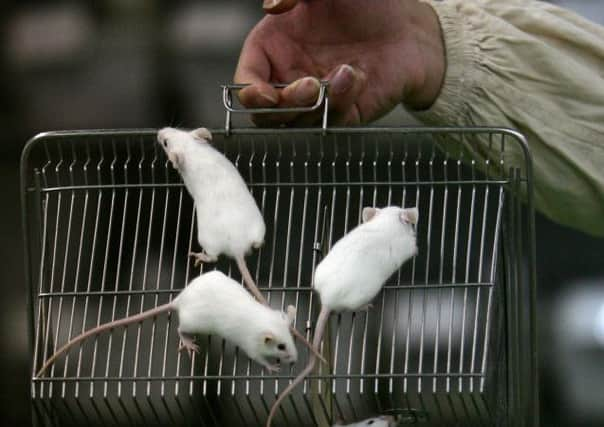Edinburgh tops UK university animal testing table


It carried out experiments on 241,865 animals, according to figures obtained by the British Union for the Abolition of Vivisection (BUAV) under a Freedom of Information request.
Experiments on just over a million animals were carried out by the six universities – Edinburgh, Oxford, Cambridge, University College London, King’s College London and Imperial College London.
Advertisement
Hide AdAdvertisement
Hide AdSome of the animals, which included monkeys, sheep and rabbits as well as rats, mice and fish, were allegedly subjected to “distressing and disturbing” procedures.
The experiments highlighted by the BUAV involved animals being brain damaged, injected with chemicals that cause severe disabilities and forced to perform repetitive computer tasks.
In one anxiety experiment at Cambridge, marmoset monkeys were said to have been blasted with loud noise and frightened with rubber snakes resembling cobras.
Other alleged procedures included Edinburgh University subjecting month-old rats to repeated electric shocks and Imperial College London creating a glass “window” in the skulls of mice before damaging their brains with a laser.
Dr Katy Taylor, head of science at the BUAV, said: “Shockingly, universities account for half of the total number of animals used in experiments carried out in the UK and are responsible for some particularly distressing and disturbing experiments.
“Yet, despite growing concern regarding animal research, much of it is publicly funded.
“It is ironic that many universities are also leaders in the research to find alternatives to using animals. So while one department may be developing cutting-edge alternatives, another may be breeding animals to be used in experiments.”
A spokesman for the University of Edinburgh defended its work. “Research using animals has played and continues to play a key role in the advancement of medical, biological and veterinary science,” he said.
Advertisement
Hide AdAdvertisement
Hide Ad“It has made a vital contribution towards the understanding, prevention, treatment and cure of a wide range of major health problems, including cancer, heart disease and psychiatric disorders.
“The University of Edinburgh uses animals in research programmes only when their use is justified on scientific, ethical and legal grounds, and when no alternatives are available.
“All such work is strictly regulated and carried out under licences, which are reviewed and approved by the Home Office and are issued only if the potential benefits of the work are likely to outweigh the effects on the animals concerned.
“The university is actively involved in the development of alternative approaches that replace, reduce and refine the use of animals in research.”
Wendy Jarrett, chief executive of the organisation Understanding Animal Research, said: “The universities named here all rank as the best research universities in the UK, so it is hardly surprising they carry out the most animal research. We have these universities to thank for numerous medical breakthroughs over the years, from penicillin to IVF to cancer drugs.”
Edinburgh University experiments
Animal - Number
Mice - 169,871
Fish - 64,755
Rats - 5,426
Birds - 1,135
Agricultural species & other ungulates - 585
Other rodents & lagomorphs - 60
Amphibia - 22
Carnivores/ monitored in the wild - 11
TOTAL - 241,865
FOLLOW US
SCOTSMAN TABLET AND MOBILE APPS